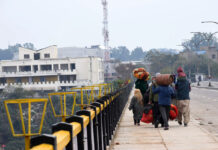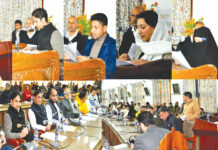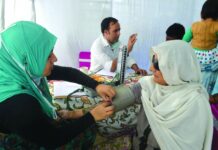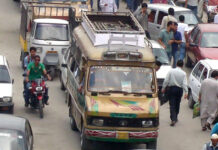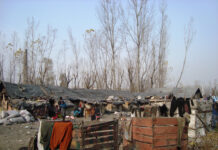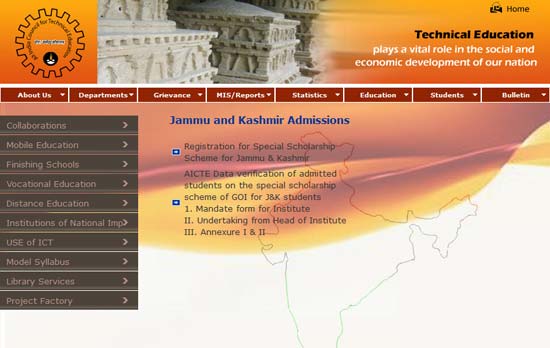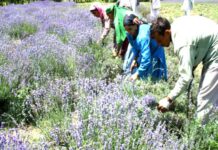The huge rush of injured and rising number of casualties since June 11 – more than 60 deaths and hundreds injured – have exposed the inadequacy of valley’s healthcare system in dealing with accident emergencies.
During the last more than two months of unrest hospitals have been under tremendous pressure as these have been receiving a huge number of patients with firearm injuries and summary beatings.
However, medical officials claim “all is well” and deny any shortages; be it the medicine or infrastructural capacity to deal with such a situation.
In the past two months of civil unrest, the Valley’s two premier hospitals received more than 600 causalities.
The injured include the ones hit by fire arms – bullets, rubber bullets, pellet guns, tear gas shells – and the ones beaten ruthlessly.
At least twelve critically injured are on life support systems.
The heavy influx of injured has strained the hospital infrastructure forcing the authorities to seek help from the civilian population and non-governmental organisations.
“We sought assistance from three NGOs in ambulance services because of the heavy rush of patients. We are receiving 200 to 400 routine patients in Out Patient Department which is far less than 2000 received on an average day. But the emergency services, are over-burdened by the rush of injured protesters,” Medical Superintendent, SK Institute of Medical Sciences Dr Syed Amin Tabish said.
However, Dr Tabish says, “We have got more than sufficient life support system both in surgical and medical intensive care units (ICU).”
The hospital has 14 ventilators.
But, a doctor working at SKIMS, requesting not to be named said the picture was not that rosy.
“We don’t have any super-specialized hospital or even a full fledged ward to cater to the huge influx of trauma cases. As Kashmir is witnessing turmoil since the last two decades we should have set up at least one separate trauma hospital in the state,” he said.
Many medicos are surprised at the government’s failure in establishing a trauma hospital or an advanced forensic sciences laboratory in a place that has been a conflict zone for almost 22 years.
There is an accident-emergency ward in SKIMS, the condition of which a senior doctor described as “pathetic”.
The deficiency in infrastructure and facilities, are somewhat neutralised by ready help by volunteers from the civil society.
To save lives, one of the most needed things is blood for transfusion. The hospitals are doing well on this count as thousands of volunteers have turned up to donate blood.
Dr. Tabish said, “Thousands of people have come forward to donate blood. But we can’t store blood in our bank for more than 14 days.”
An official in the blood transfusion and immunology department at SKIMS said that they have enough stock of blood in the hospital. “We have around 1500 donors on record (listed with them) and whenever the need arises, they are contacted according to our requirements,” the official said, “These volunteers are available round the clock so we don’t run short of blood.”
Same is the case with another major hospital of the valley SMHS hospital.
Medical Superintendent SMHS hospital, Srinagar Dr Waseem Qureshi said, “I had myself appealed for blood donation. The response was overwhelming.”
“Our blood bank is operational round the clock,” he added.
Doctors say that getting supplies (medicine/ surgical) has been a major challenge for the valley hospitals due to frequent curfews and shutdowns.
“Getting supplies from outside has been hard due to continuous curfews and hartals. We have asked civil societies to come forward on this front and have also persuaded our suppliers from outside, to send life-saving drugs,” said Dr. Tabish.
The SKIMS is the only tertiary care hospital in the valley. Patients who had sustained non-fatal firearm injuries or are stable are shipped out to either JVC hospital or the Bone and Joints hospital, to make way for more critical patients.
SKIMS has the capacity to cater to 20 odd accident emergency patients.
The curfews and other restrictions have hindered movement of the medical staff. However, most of the doctors have voluntarily shifted to hospital campuses to remain available in the hospital. Many doctors prefer continuous duty for days and then a subsequent break to remain with their families.
 People complain that curfews and restrictions were hindering their access to healthcare.
People complain that curfews and restrictions were hindering their access to healthcare.
Sources in the hospital say that the delay in bringing an injured to the hospital, makes treating the patient more difficult.
An injured admitted in the SMHS hospital said, “I was part of the demonstration in which people were protesting the murder of an 8-year-old in Batamaloo, who was beaten to death by police and CRPF. The police went berserk and I fainted on the spot.”
He alleged that CRPF did not allow his family to remove him to the hospital.
“When my conditions worsened my family members pleaded before the CRPF to allow us but they told us we should have given a thought before joining the protest,” he said. “When we contacted the officials of SMHS for ambulance, they said that they cannot send one due to the fear of stone pelting in the area.”
The inability of the patients to reach hospitals, sources say, has forced the cancellation of more than eighty percent scheduled surgeries.
“Many patients requiring chemo and medical therapies have failed to show up due to the current situation, in most of the cases sending, all the gains of earlier treatment down the drain,” said a radiologist in the SKIMS.
Meanwhile, patients suffering from hypertension, diabetes, tuberculosis, neurological ailments or psychiatric diseases, who have to take medicines regularly, are finding it difficult to buy medicines, as the chemists are running out of stocks and are not getting new supplies.
Many psychiatrists and clinical psychologists say that patients on psychotropic drugs like anti-depressants, tranquilizers and other sedatives are vulnerable to a relapse.
“We get lot of calls from our patients, who are not able to get pain relievers, epilepsy drugs and other required medicine. This can even reverse the condition of the patients who have shown improvement by taking proper medicines,” said a senior doctor in the Valley’s only psychiatric diseases hospital.


